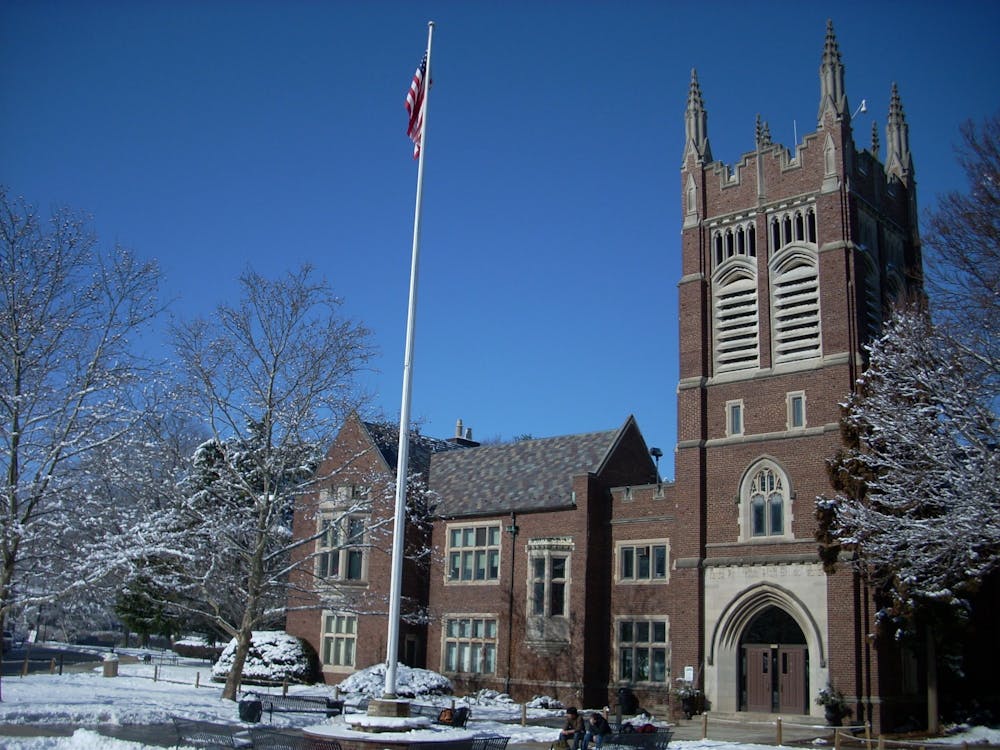A video posted in late June of Princeton High School (PHS) students saying the n-word while singing to a song at a party has reignited longstanding debate about the school system’s handling of racist incidents.
PHS parents and students have expressed dismay at the lack of disciplinary action taken against the students in the video, as well as claims that principal Jessica Baxter personally contacted several students to caution them against making any social media posts about the subject.
Taken at a party and circulated on Snapchat, the video depicts a group of white students and graduates singing to Pop Smoke’s “Dior.” Students offended by the video posted clips to Instagram, including captions showing the lyrics. The video was shared to and later removed from a number of accounts, including @dearwhitepeoplenj, which highlights racist incidents across the state.
Planet Princeton reported that several students who reposted the video were contacted by lawyers who threatened to take legal action if the videos were not removed, claiming the shared videos were misrepresentative. The Daily Princetonian confirmed that at least one student received such a letter.
The video is the latest in a series of racist incidents over the past few years involving PHS students. In 2016, photos emerged of students at a party playing a “Nazis Vs. Jews”-themed game of beer pong — with cups laid out in the shapes of a Star of David and a Swastika. The next year, a student complained of being on the bus “with a bunch of n*****.” This April, another PHS student posted a TikTok mocking Africans.
The video also preceded a similar controversy at the University. Shortly after a white student’s use of the n-word in a Facebook post in July provoked intense backlash, administrators asserted that the University permits certain uses of slurs — including language that runs “contrary to Princeton’s commitment to stand for inclusivity and against racism.”
PHS administrators have taken no disciplinary action against the students, citing this latest incident’s occurrence during the summer and outside of direct school jurisdiction.
In an email sent to PHS students on July 12, Baxter condemned the video and encouraged students to reach out to her “or [her] administrative team if they would like to have a conversation.” She also wrote that if school were in session or “there was not a global pandemic,” she would bring all students involved to engage in dialogue, but felt that conversations conducted via Zoom or social media were unproductive.

When reached for comment, Baxter said that Princeton Public Schools (PPS) is “responding to and providing resources to community groups and students who have requested them.”
For the fall, PPS is developing an online racial literacy course for students, staff, and eventually committee members to take, according to Baxter. Interim Superintendent Barry Galasso has also met with members of the Black Parents Affinity Group and the Civil Rights Commission.
Students and alumni who spoke with the ‘Prince’ said they were surprised neither at the content of the video nor at the lack of disciplinary action taken against the students.
“It’s almost a form of gaslighting, really, because PHS claims to be a very diverse place where they’re very inclusive, but the way they handle it is usually sweeping it under the rug, trying to avoid any bad press,” said PHS alum and current University student Valeria Torres-Olivares ’22.

Students in the video and their lawyers claimed that the videos, some of which have text of the song’s lyrics imposed on them, were edited to create a false impression of events.
A PHS student speaking on the condition of anonymity said they and several of their peers were contacted by a lawyer threatening legal action if they did not remove their repost of the video. In a letter to a student shown to the ‘Prince,’ a lawyer representing one of the students in the video, named as John Doe, wrote that relevant posts and uploads of the video “illegally publish and depict Doe, a minor, but also misrepresent Doe’s involvement in the Video.”
“The Video has been edited in a manner to convey the false impression that Doe and the teenagers dancing in the Video were advocating and promoting racist and anti-LGBTQ+ sentiments,” the letter continues. “This was not the case at all. The teenagers in the Video gathered for a final gathering to celebrate their high school graduation before they begin their college careers.”
In its reporting, Planet Princeton quoted the excerpt’s last two sentences.
One of the students the ‘Prince’ spoke with expressed confusion about accusations of editing. They said reposted editions of the video were the same as the original, only shortened and captioned with the song’s lyrics.
The lawyer in question did not respond to request for comment.
In 2016, photos of the beer pong incident sparked similar backlash, with some criticizing now-alumna Jamaica Ponder for further circulating the images. Another then-student told The New York Times that many felt Ponder should have blurred the players’ faces in the photo, fearing that the publicity could hurt the players’ standing with their sports teams and their chances of getting into college.
In a late-July open letter titled “Letter from PPS Black Parents Affinity Group to the Princeton Board,” 19 PHS parents — including several University faculty and staff members — alleged that Baxter “did not disclose that in an act of intimidation, she also called parents of students of color and warned them that their children should remove social media postings about the incident and criticizing the school district.”
Principal Jessica Baxter did not respond to a request for comment about this claim. In an email to a PHS student shown to the ‘Prince,’ Baxter wrote that the school does not “police social media.”
One parent who says Baxter called them about their child’s social media content, speaking on the condition of anonymity, said that they were troubled by the school’s handling of the matter.
“There is no direct nexus between what the students did and the school … and therefore, it is not a school issue, yet, we get an email, and I get a phone call, and I am being asked about the posts,” they said, referring to the general email Baxter sent to the student body and the private phone call. “So there lies the paradox, right?”
“These actions raise serious concerns about the principal’s attempts to intimidate some parents while advocating for the students in the video,” the letter from the Black Parents Affinity Group continues. “Being party to intimidation of students and parents who raise legitimate concerns about the offensive video has obvious implications for the school’s climate and the disruption of education.”
Another PHS student who spoke anonymously told the ‘Prince’ they “really have grown to look at Princeton — the education system, the public school education system — and questioned the authoritative nature of it.”
“It’s a work in progress, there’s still a lot of work to be done, and it’s not going to happen overnight, but I’m damn sure going to try my hardest to make sure that it happens before the beginning of the school year, to get more regulations in place for Black students and just students of color in general,” they added.
“This stuff … shouldn’t be surprising to anyone, and unfortunately, that is the reality of the kind of world that we do live in,” another student added. “This incident is not different than anything else that has happened, it just got widely publicized, and people should be focused on the fact that this behavior is happening, not that it was posted.”
Though a racial literacy course was implemented after student backlash against previous incidents, enrollment in the course is voluntary. PHS alum Brianna Silva started a petition to make the racial literacy course mandatory. The online petition — which has since garnered over 3,800 signatures — also calls for student involvement in planning the course and periodic emails showing the administration’s progress.
To explain why such a course “must be mandatory,” the petitioners refer to the controversy surrounding the video. “The students who really need to hear about the school-to-prison pipeline, institutionalized racism, and white privilege, are the same students gleefully singing the N-word,” the petition notes.
The parents’ group also calls for this mandatory course. Additionally, they request the hiring of an outside consultant “to advise the district on implementing a district-wide, high-quality, comprehensive curriculum.”
A number of PHS-based and community advocacy groups, including the Multiracial Student Achievement Network (MSAN), the Black Student Union at PHS, and Not in Our Town Princeton, of which Torres-Olivares is a member, have sought to and/or organized discussions on the topic.
In late July, Joint Effort Princeton Safe Streets, an annual week-long series of events celebrating Black culture in Princeton, held a virtual forum on “Racism in Princeton, PHS Student Video, John Witherspoon Middle School Name Change, and More.” Panelists included PPS Interim Superintendent Barry Galasso as well as representatives from the city, School Board, PPS teaching staff, Not in Our Town Princeton, and others.
In early August, a PHS student group, Restorative Coalition, organized two conversations in partnership with PHS administration, students, and community members to discuss the video and preventative steps moving forward. Three co-founders of the organization, current PHS students Soorya Baliga and Sanyukta Mudakannavar and recent PHS graduate Raisa Rubin-Stankiewicz, expressed hope for reforms moving forward and gratitude for Baxter’s collaboration in organizing the circles.
The organization was founded by students in January 2019 in collaboration with PPS administration to compose a statement of values addressing diversity and equity within the community. Mudakannavar said that the statement represented the values and vision of a diverse group of students.
“We wanted to have some sort of a process to … have discussion about this in a way that was productive,” Rubin-Stankiewicz said. “We reached out to the district to ask about having some sort of a restorative circle, to be able to have discussions about recent racial events and how the district and the community can work towards racial healing and progress.”
Proposals to mandate or otherwise expand PHS’s racial literacy course took high priority during the conversations. Another idea that emerged during the discussions was the creation of student councils to respond to instances of bias.
“It would be really really important to talk a little bit about … if there’s a procedure for how we deal with similar incidents of bias because they’re obviously going to be something that continues to happen,” Rubin-Stankiewicz said.
“It’s very important … that we trust that things are going to change and that things aren’t hopeless, and that we’re working as a community towards being a more equitable place, and I think that that sort of trust can only come when there’s hope that things will be dealt with in a more restorative manner,” Baliga said.








